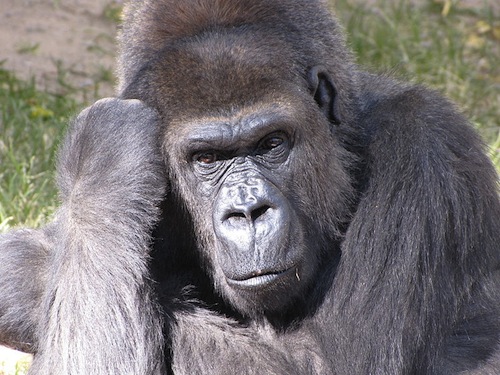 Culture & Ethics
Culture & Ethics
 Evolution
Evolution
Jerry Coyne Endorses Free Will (Inadvertently as You Might Expect)

Referring to Mary Midgely, a leading philosopher who insists that Richard Dawkins’s concept of "selfish genes" is incoherent, Jerry Coyne at Why Evolution Is True defends Dawkins:
[The concept of] "selfish gene" is not confusing if you have sufficient neurons to see that Richard what Dawkins meant [sic]: the differential sorting of genes that is natural selection involves genes behaving as if they were selfish: trying to outcompete their mates and get into the next generation of bodies. Apparently Midgley had such a problem. But Dawkins certainly did not, despite what [Guardian columnist Andrew] Brown claims.
Metaphors are useful if as [sic] they enlighten rather than confuse. I claim that both "selection pressures" and "selfish genes" are enlightening, and, judging by the sales of Dawkins’s book, so do most readers….
[M]etaphors, often involving the use of anthropomorphizing, are ubiquitous in all of science, not just evolutionary biology. "Selfish gene" is just one of these. I would argue that anyone who can’t understand, after a minute’s explanation, that selfish genes really aren’t conscious and malevolent entities, is lacking some crucial rationality. Likewise, it’s not hard to see how "selfish genes" can lead to cooperative behavior. That, too, is easily explained, and has been done many times by Dawkins and others. Nevertheless, people like Midgley and many theologians argue that the notion of selfish genes simply can’t explain unselfish behavior. They’re ignorant — often willfully so.
Here’s an excerpt from Midgley’s reply to Dawkins:
It is rather striking that Richard Dawkins, when he treats of human motives in The Selfish Gene, …reverts to full-scale Hobbism. In this discussion — which is quite distinct from his account of "gene-selfishness" — he writes flatly that "we are born selfish" — we ourselves, not the genes. The word selfish clearly has its normal, negative sense here because he has just written that, if we wish
to build a society in which individuals co-operate generously and unselfishly… you can expect little help from biological nature. Let us try to teach generosity and altruism, because we are born selfish. Let us understand what our own selfish genes are up to, because we may then have a chance to upset their design, something which no other species has ever aspired to.
It is surely rather surprising that we — creatures who are, as he has explained, merely lumbering robots, survival-machines entirely controlled by these super-beings — are, at this stage of our evolution, suddenly free to rise up with one bound and overpower them. Dawkins’s first explanation for this is still that of Hobbes — our extra intelligence, producing enlightened self-interest.
We have at least the equipment to foster our long-term self-interest rather than our short-term self-interest. We can see the long-term benefits of participating in a ‘conspiracy of doves’.
This seems to imply, rather strangely, that nobody has tried to enlighten self-interest up till now. Moreover, it suggests that intelligence is independent of genetic causes. But still more remarkable is Dawkins’s next proposal — one that would have shocked Hobbes profoundly. Dawkins writes,
We can even discuss ways of cultivating and nurturing pure, disinterested altruism, something that has no place in nature, something that has never existed before in the whole history of the world…. We have the power to turn against our creators. We, alone on earth, can rebel against the tyranny of the selfish replicators.
Hobbes would have pointed out pretty sharply that this is a metaphysical claim to a very strong form of free-will — a mental ability to resist physical causes. Moreover, he would have asked what could possibly be the motivation for trying to transform one’s own basic wishes so completely?
If we lumbering robot survival machines are to upset the design of our genes, we cannot be deterministic survival machines. As Midgely cogently observes, only free will — in fact, very strong libertarian free will — could permit us liberation from our selfish genes.
Coyne defends Dawkins’s theory of selfish genes. If Coyne believes, as Dawkins does, that we can upset the design of our selfish genes and practice genuine generosity and altruism, then Coyne presupposes strong free will — an idea he has repeatedly rejected up until now.
Cognitive dissonance is inherent to materialism.
Image credit: Wikicommons.
